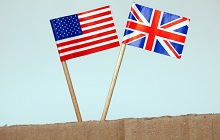See the Difference! American English and British English
August 22, 2016

It is no surprise that differences exist within the same language depending on the region, just as with Japanese, where standard language and regional dialects differ. As Japanese, the more English we learn, the more curious we become about the differences between American English and British English. At times, these differences may even cause us to feel that something is off-key with a conversation. Simply being aware that variations exist within the same language makes a difference to our communication. Let's take a look at the fundamental differences between American English and British English.
Differences in Vocabulary
American English and British English sometimes adopt different words, despite the fact that they express the same meaning.
Example:
Soccer/Football: soccer (Ameri-can)/football (British)
*In the USA, "football" refers to American football.
Example:
Cookie/Biscuit: cookie (American)/biscuit (British)
*In the USA, many people associate the word "biscuit" with the fast-food restaurant menu item of the same name.
Differences like those mentioned above might merely result in mild bewil-derment, but there are some expressions that we should watch out for in order to avoid major confusion when visiting the USA or UK on vacation or business trips.
Example:
The first/ground floor of a building: first floor (American)/ground floor (British)
In British English, the "first floor" refers to the second level of a building. You might say to a friend or colleague, "Let's meet on the first floor." Despite having arranged a meeting place, there is a chance that you won't manage to find each other due to a misunderstanding. When arranging to meet on the first level of a building, it is safer to add expressions like "street level", just in case.
Example:
Subway/Underground: subway (Ameri-can)/underground or tube (British)
In British English, "subway" refers to a pedestrian underpass rather than an underground rapid transit system. When you lose your bearings on the way to an appointment in the UK and ask a person on the street for help, you may be told, "You can use the subway." Be careful not to go searching for the tube station!
Differences in Spelling
It is possible to tell whether a person's English is American English or British English by looking at their spelling.
Difference in the unaccented syllable -or (American)/-our (British)
Examples:
Color/Colour: color (American)/colour (British)
Favorite/Favourite: favorite (American)/favourite (British)
Difference in the ending -er/-re
Examples:
Center/Centre: center (American)/centre (British)
Theater/Theatre: theater (American)/theatre (British)
Differences in spelling do not create a major problem, regardless of which variation you use. However, we do need to pay attention to methods of describing the date. In Japanese, the date is written in the order of year, month, and day. For exam-ple, "2014/11/7" describes November 7, 2014. English, however, not only differs from Japanese, but there is also a dissimilarity between the methods used in the USA and the UK.
Example)
American English: 11/07/2014 (Month, Day, Year)
British English: 07/11/2014 (Day, Month, Year)
Dates are also of key importance in business, so we should pay close attention to the way that they are written. Depending on the numbers, there can be misunderstandings over the correct month and day.
Differences in Pronunciation
Variations in pronunciation and accent are one of the more striking differ-ences between American English and British English. Once you have listened to lots of English and grown accustomed to it, you will be able to guess the birthplace of your conversation partner just by hearing them speak.
American English
"T" is silent: "what" is pronounced like "wah", and "cut" is pronounced like "kah."
"T" becomes a "d" sound: "water" sounds like "waw-der", and "party" sounds like "par-dy."
"R" is clearly pronounced.
"R" can be difficult to pronounce for many people, but this "r" sound is in fact a key characteristic of American English.
British English
"R" is silent: "water" sounds like "waw-tah", "door" sounds like "daw", and "better" sounds like "beh-tah."
"Often" is pronounced "off-tun." In American English, the "t" sound is dropped, becoming "oh-fen."
Recognize That Differences Exist
By recognizing that differences exist within the English language depend-ing on the region, the scope of your ability to handle business situations involving for-eign people also widens. While avoiding unexpected misunderstandings is an obvious benefit, you will also be able to show consideration for your conversation partner and occasionally make a smart impression with your well-chosen words. First of all, let's start by listening to many different people's English.
Related Services
| << Using Without Knowing!? Spanish Language Familiar to Japanese People | The Spelling Alphabet -- A Solution to Spelling Mistakes Over the Phone! >> |
To Contact Us Regarding Our Translation Services
For urgent needs, call:
+81-3-5730-6133
